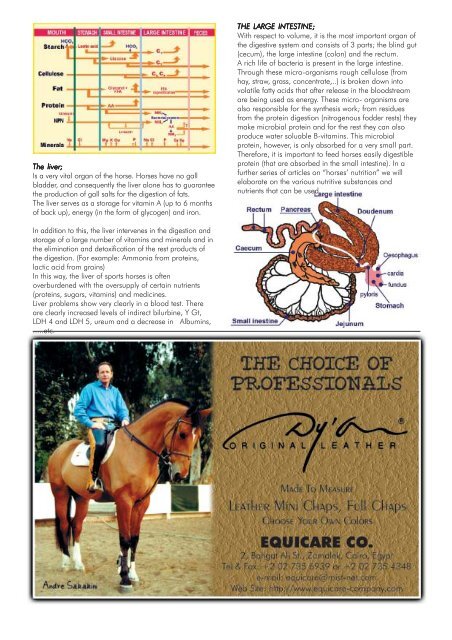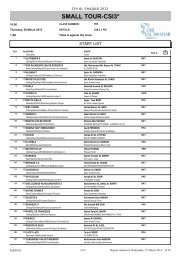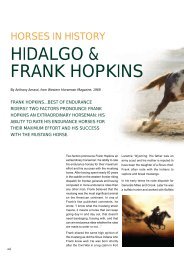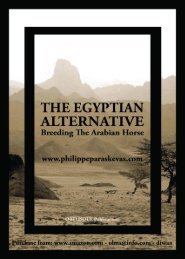HORSES OF THE DUTCH HORSES OF THE DUTCH - Horse Times
HORSES OF THE DUTCH HORSES OF THE DUTCH - Horse Times
HORSES OF THE DUTCH HORSES OF THE DUTCH - Horse Times
Create successful ePaper yourself
Turn your PDF publications into a flip-book with our unique Google optimized e-Paper software.
The The liver;<br />
liver;<br />
Is a very vital organ of the horse. <strong>Horse</strong>s have no gall<br />
bladder, and consequently the liver alone has to guarantee<br />
the production of gall salts for the digestion of fats.<br />
The liver serves as a storage for vitamin A (up to 6 months<br />
of back up), energy (in the form of glycogen) and iron.<br />
In addition to this, the liver intervenes in the digestion and<br />
storage of a large number of vitamins and minerals and in<br />
the elimination and detoxification of the rest products of<br />
the digestion. (For example: Ammonia from proteins,<br />
lactic acid from grains)<br />
In this way, the liver of sports horses is often<br />
overburdened with the oversupply of certain nutrients<br />
(proteins, sugars, vitamins) and medicines.<br />
Liver problems show very clearly in a blood test. There<br />
are clearly increased levels of indirect bilurbine, Y Gt,<br />
LDH 4 and LDH 5, ureum and a decrease in Albumins,<br />
.....etc.<br />
<strong>THE</strong> <strong>THE</strong> LARGE LARGE INTESTINE INTESTINE; INTESTINE<br />
With respect to volume, it is the most important organ of<br />
the digestive system and consists of 3 parts; the blind gut<br />
(cecum), the large intestine (colon) and the rectum.<br />
A rich life of bacteria is present in the large intestine.<br />
Through these micro-organisms rough cellulose (from<br />
hay, straw, grass, concentrate,..) is broken down into<br />
volatile fatty acids that after release in the bloodstream<br />
are being used as energy. These micro- organisms are<br />
also responsible for the synthesis work; from residues<br />
from the protein digestion (nitrogenous fodder rests) they<br />
make microbial protein and for the rest they can also<br />
produce water soluable B-vitamins. This microbial<br />
protein, however, is only absorbed for a very small part.<br />
Therefore, it is important to feed horses easily digestible<br />
protein (that are absorbed in the small intestine). In a<br />
further series of articles on “horses’ nutrition” we will<br />
elaborate on the various nutritive substances and<br />
nutrients that can be used.














